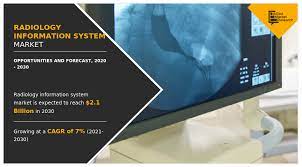
Radiology Information System Market: Driving Efficiency and Accuracy in Radiology Operations

Radiology Information System Market Statistics1
PORTLAND, OREGON, UNITED STATES, March 21, 2023 /EINPresswire.com/ -- 𝐑𝐚𝐝𝐢𝐨𝐥𝐨𝐠𝐲 𝐈𝐧𝐟𝐨𝐫𝐦𝐚𝐭𝐢𝐨𝐧 𝐒𝐲𝐬𝐭𝐞𝐦 𝐌𝐚𝐫𝐤𝐞𝐭 𝐒𝐭𝐚𝐭𝐢𝐬𝐭𝐢𝐜𝐬, 𝟐𝟎𝟑𝟎
Rapidly increase in the aging population, rise in the number of chronic diseases, and surge in adoption of cloud technology-related services drive the growth of the global radiology information system market. However, rise in concerns regarding patient data safety & security hinders the market growth. On other hand, rise in investments in the Asia-Pacific region presents new opportunities in the coming years.
The global radiology information system industry generated $1.05 billion in 2020, and is expected to reach $2.14 billion by 2030, witnessing a CAGR of 7.0% from 2021 to 2030.
A Radiology Information System (RIS) is a computer-based system used by radiology departments to manage patient information, appointment scheduling, billing, and reporting of radiology procedures.
It allows radiologists, technicians, and administrative staff to access and update patient records, track the progress of imaging studies, and communicate with other healthcare professionals.
By using a RIS, radiology departments can improve efficiency, reduce errors, and streamline communication between different departments and facilities. It can help ensure that patients receive the right tests at the right time, and that the results are accurately recorded and shared with other members of the healthcare team.
𝐃𝐨𝐰𝐧𝐥𝐨𝐚𝐝 𝐒𝐚𝐦𝐩𝐥𝐞 𝐑𝐞𝐩𝐨𝐫𝐭- https://www.alliedmarketresearch.com/request-sample/1128
𝐀 𝐑𝐚𝐝𝐢𝐨𝐥𝐨𝐠𝐲 𝐈𝐧𝐟𝐨𝐫𝐦𝐚𝐭𝐢𝐨𝐧 𝐒𝐲𝐬𝐭𝐞𝐦 (𝐑𝐈𝐒) 𝐭𝐲𝐩𝐢𝐜𝐚𝐥𝐥𝐲 𝐢𝐧𝐜𝐥𝐮𝐝𝐞𝐬 𝐬𝐞𝐯𝐞𝐫𝐚𝐥 𝐬𝐞𝐠𝐦𝐞𝐧𝐭𝐬 𝐨𝐫 𝐦𝐨𝐝𝐮𝐥𝐞𝐬 𝐭𝐡𝐚𝐭 𝐰𝐨𝐫𝐤 𝐭𝐨𝐠𝐞𝐭𝐡𝐞𝐫 𝐭𝐨 𝐦𝐚𝐧𝐚𝐠𝐞 𝐯𝐚𝐫𝐢𝐨𝐮𝐬 𝐚𝐬𝐩𝐞𝐜𝐭𝐬 𝐨𝐟 𝐫𝐚𝐝𝐢𝐨𝐥𝐨𝐠𝐲 𝐨𝐩𝐞𝐫𝐚𝐭𝐢𝐨𝐧𝐬. 𝐓𝐡𝐞𝐬𝐞 𝐬𝐞𝐠𝐦𝐞𝐧𝐭𝐬 𝐦𝐚𝐲 𝐢𝐧𝐜𝐥𝐮𝐝𝐞:
Patient management: This segment manages patient registration, demographic information, scheduling of appointments, and tracking of patient exams.
Image management: This segment manages the storage, retrieval, and distribution of medical images generated by radiology procedures, such as X-rays, MRI scans, and CT scans.
Workflow management: This segment tracks the progress of radiology exams from scheduling to final reporting and ensures that they are performed in the correct order.
Reporting: This segment generates and distributes reports to referring physicians, detailing the results of radiology exams and any recommended follow-up.
Billing and financial management: This segment manages billing, invoicing, and payment processing related to radiology exams and procedures.
Quality control: This segment manages the quality of radiology exams and procedures, ensuring that they meet established standards and protocols.
Overall, these segments work together to provide an efficient, effective, and streamlined system for managing radiology operations and patient care.
𝐂𝐨𝐯𝐢𝐝-𝟏𝟗 𝐬𝐜𝐞𝐧𝐚𝐫𝐢𝐨-
The Covid-19 pandemic led to increased demand for radiology techniques such as CT scans, X-rays, and MRI scans to determine the level of infection. This resulted in rise in demand for radiology information systems for efficient operations of radiology departments.
The R&D activities for radiology information systems reduced due to lockdown restrictions and hindrances in effective development operations. Market players needed to establish new methods of working.
𝐆𝐞𝐭 𝐝𝐞𝐭𝐚𝐢𝐥𝐞𝐝 𝐂𝐎𝐕𝐈𝐃-𝟏𝟗 𝐢𝐦𝐩𝐚𝐜𝐭 𝐚𝐧𝐚𝐥𝐲𝐬𝐢𝐬 - https://www.alliedmarketresearch.com/request-for-customization/1128?reqfor=covid
𝐓𝐡𝐞𝐫𝐞 𝐚𝐫𝐞 𝐬𝐞𝐯𝐞𝐫𝐚𝐥 𝐟𝐚𝐜𝐭𝐨𝐫𝐬 𝐭𝐡𝐚𝐭 𝐜𝐚𝐧 𝐢𝐦𝐩𝐚𝐜𝐭 𝐭𝐡𝐞 𝐞𝐟𝐟𝐞𝐜𝐭𝐢𝐯𝐞𝐧𝐞𝐬𝐬 𝐨𝐟 𝐚 𝐑𝐚𝐝𝐢𝐨𝐥𝐨𝐠𝐲 𝐈𝐧𝐟𝐨𝐫𝐦𝐚𝐭𝐢𝐨𝐧 𝐒𝐲𝐬𝐭𝐞𝐦 (𝐑𝐈𝐒), 𝐢𝐧𝐜𝐥𝐮𝐝𝐢𝐧𝐠:
Integration with other healthcare systems: The ability to integrate with electronic health record (EHR) systems, picture archiving and communication systems (PACS), and other clinical systems can improve data sharing and coordination of care.
Usability: The system should be user-friendly and intuitive, with easy-to-use interfaces for both clinicians and administrative staff.
Security and compliance: The system must comply with relevant healthcare regulations, including the Health Insurance Portability and Accountability Act (HIPAA) and other data privacy and security laws.
Interoperability: The ability to share data with other healthcare providers and systems, including those outside of the organization, can improve coordination of care and patient outcomes.
Technical support and maintenance: The system should have reliable technical support and regular maintenance to ensure that it is operating effectively and efficiently.
Cost: The cost of implementing and maintaining the system can impact its adoption and long-term viability, so it is important to consider the return on investment (ROI) and potential cost savings.
Overall, a well-designed and well-implemented RIS that addresses these factors can improve the quality of patient care, increase efficiency, and reduce errors in radiology operations.
𝐑𝐞𝐠𝐢𝐨𝐧𝐚𝐥 𝐀𝐧𝐚𝐥𝐲𝐬𝐢𝐬:
North America contributed the highest market share in terms of revenue in 2020, accounting for more than two-fifths of the global radiology information system market, and is projected to continue its lead position by 2030. This is attributed to presence of advanced healthcare infrastructure and large government spending on healthcare facilities. However, Asia-Pacific is estimated to witness the largest CAGR of 9.0% during the forecast period. This is due to surge in demand for healthcare facilities owing to rapid growth of the population.
𝐅𝐨𝐫 𝐏𝐮𝐫𝐜𝐡𝐚𝐬𝐞 𝐈𝐧𝐪𝐮𝐢𝐫𝐲- https://www.alliedmarketresearch.com/purchase-enquiry/1128
𝐏𝐫𝐨𝐦𝐢𝐧𝐞𝐧𝐭 𝐦𝐚𝐫𝐤𝐞𝐭 𝐩𝐥𝐚𝐲𝐞𝐫𝐬-
General Electric Company
Allscripts Healthcare Solutions, Inc.
Carestream Health, Inc
Cerner Corporation
Epic Systems Corporation
IBM
Koninklijke Philips N.V.
McKesson Corporation
MedInformatix, Inc
Siemens AG
𝐒𝐢𝐦𝐢𝐥𝐚𝐫 𝐑𝐞𝐬𝐞𝐚𝐫𝐜𝐡 𝐑𝐞𝐩𝐨𝐫𝐭𝐬 𝐟𝐨𝐫 𝐈𝐧𝐟𝐨𝐫𝐦𝐚𝐭𝐢𝐨𝐧, 𝐂𝐨𝐦𝐦𝐮𝐧𝐢𝐜𝐚𝐭𝐢𝐨𝐧 𝐚𝐧𝐝 𝐓𝐞𝐜𝐡𝐧𝐨𝐥𝐨𝐠𝐲:
𝐀𝐛𝐨𝐮𝐭 𝐀𝐥𝐥𝐢𝐞𝐝 𝐌𝐚𝐫𝐤𝐞𝐭 𝐑𝐞𝐬𝐞𝐚𝐫𝐜𝐡:
Allied Market Research (AMR) is a full-service market research and business-consulting wing of Allied Analytics LLP based in Portland, Oregon. Allied Market Research provides global enterprises as well as medium and small businesses with unmatched quality of "Market Research Reports" and "Business Intelligence Solutions." AMR has a targeted view to provide business insights and consulting to assist its clients to make strategic business decisions and achieve sustainable growth in their respective market domains. AMR offers its services across 11 industry verticals including Life Sciences, Consumer Goods, Materials & Chemicals, Construction & Manufacturing, Food & Beverages, Energy & Power, Semiconductor & Electronics, Automotive & Transportation, ICT & Media, Aerospace & Defense, and BFSI.
David Correa
Allied Analytics LLP
+1-800-792-5285
email us here
EIN Presswire does not exercise editorial control over third-party content provided, uploaded, published, or distributed by users of EIN Presswire. We are a distributor, not a publisher, of 3rd party content. Such content may contain the views, opinions, statements, offers, and other material of the respective users, suppliers, participants, or authors.

